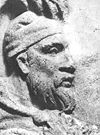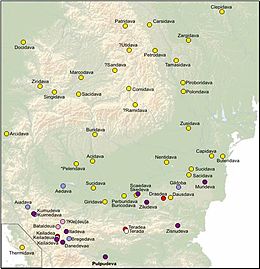- Moesi
-
For the cache coherency protocol, see MOESI protocol.
The Moesi (Greek: Μοισοί) were a Daco-Thracian tribe who inhabited present day Serbia and Bulgaria, part of the then Roman province of Moesia, which was named after them in 87 AD by the Romans after the Romans under Crassus defeated them in the 29 BC.
Contents
History
The Romans chased an army of the Bastarnae and marched towards the Moesi, successfully overtaking their stronghold and subduing the majority of the tribe.
They were formed out of the 14th century BC Brnjica culture.[1] Thracologists suggest that the Moesi may have spoken a language or dialect intermediary between Dacian and Thracian.
Language and culture
The large number of Dacian/Moesian davae (town names end in '-dava' or '-deva') across entire Moesia, parts of Thrace and Dalmatia, indicates a much closer linguistic affinity between Dacian and Moesian languages, than between Moesian and Thracian, hinting to a much closer connection between Dacians and Moesians. The distinctly Thracian -para and -bria endings for town names are mostly present south of Moesia, making the Balkan Mountains (Haemus Mons) the linguistic border between Daco-Moesian and Thracian languages and cultures.[2]
The close Dacian-Moesian connection is further emphasized by the fact that significant areas of Moesia were part of Burebista's Dacian kingdom formed by creating a union of related Geto-Dacian, Moesian and Thracian tribes. Additionally, after the Roman conquest of Moesia, the Geto-Dacians constantly raided across the Danube, under kings like Duras and Diurpaneus, harassing Roman troops and attempting to regain lost territory.
From the Moesian language or dialect, only a few items are recorded; their ethnonym (Moesoi, Moesi), some toponyms and anthroponyms, and a phytonym: Mendruta, the Moesian name for the False Helleborine (L. Veratrum nigrum) or the Beet (L. Beta vulgaris).
See also
- List of ancient tribes in Thrace and Dacia
- List of ancient cities in Thrace and Dacia
- Dacian language
- Daco-Thracian
- Moesia
- Dacia
Notes
References
- Olteanu, Sorin. "Linguae Thraco-Daco-Moesorum - Toponyms Section" (in Romanian, partially in English). Linguae Thraco-Daco-Moesorum. http://soltdm.com/geo/arts/categs/categs.htm. Retrieved 08 December 2010.
External links
- Sorin Olteanu's Project: Linguae Thraco-Daco-Moesorum - Toponyms Section (Romanian, partially English)
Dacia topics Dacian tribes: Aedi · Albocense · Anartes · Apuli · Artakioi · Biephi · Biessoi · Buri · Carpi · Cauci · Ciaginsi · Clariae · Costoboci · Cotini · Crobidae · Daci · Getae · Moesi · Osi · Peukini · Piephigi · Potulatense · Predasense · Rhadacense · Saldense · Scaugdae · Sense · Suci · Terizi · Teurisci · Trixae · Tyragetae · Troglodytae
Dacian kings: Culture and civilisation: Art, jewellery, treasures, tools (Bracelets) · Clothing · Foreign Relations (Greeks · Celts · Romans · Germanic tribes) · Warfare (Falx · Sica · Thracian warfare)
Sarmizegetusa · Argidava · Buridava · Cumidava · Piroboridava · Sucidava · More towns... · Davae · Dacian Fortresses of the Orăştie Mountains · Murus dacicusWars with the
Roman Empire:Roman Dacia: Dacia Traiana · Moesia · Scythia Minor · Dacia Aureliana · Diocese of Dacia · Dacia Mediterranea · Dacia Ripensis · Trajan (Bridge · Column) · Towns and cities · Castra · Limes (Alutanus · Moesiae · Porolissensis · Sarmatiae · Transalutanus · Trajan's Wall · Brazda lui Novac) · Language (Thraco-Roman · Eastern Romance substratum)Research on Dacia: Books on Dacia · Dacian archaeology · Archaeological sites in Romania · Dacology · Thracology · ProtochronismWikiProject • Commons • Dacian fortresses, settlements, Roman castra, limes from Romania: Google Maps • Google Earth Pre-Roman 
Roman Serbia TimachiT · TricornensesT~C · CornacatesC · AmantiniI · AlbocenseD · GalabriT~I
Cultural groups: TThracian · DDacian · IIllyrian · CCeltic. ~Mixed Categories:- Ancient tribes in the Balkans
- Ancient tribes in Dacia
- Ancient tribes in Bulgaria
- Ancient tribes in Serbia
- Ancient tribes in Romania
- Moesia
- Ethnicity stubs
- Dacia stubs
- Ancient Thrace stubs
Wikimedia Foundation. 2010.


